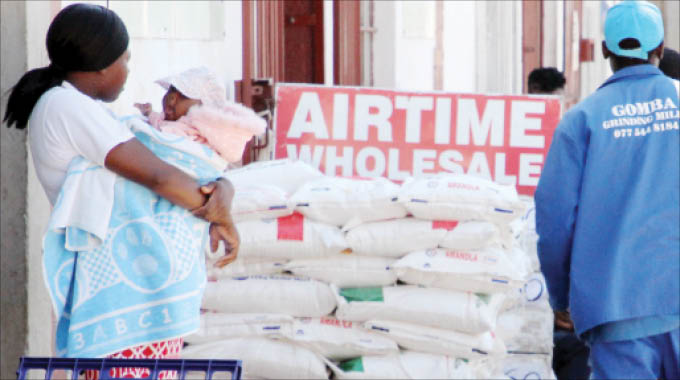EDITORIAL COMMENT: Swiftly fine-tune supply of subsidised roller meal

A removal of a subsidy on maize bought by commercial millers from the Grain Marketing Board (GMB) in November last year saw the price of mealie-meal doubling.
The sharp price increase that came amid similar hikes in the cost of a range of other basic commodities, sparked a national outcry. Recognising that most people were struggling to buy the basic commodity, President Mnangagwa ordered the restoration of the subsidy. It was later resolved that it be effected specifically on roller meal. The Government estimated that it would spend $180 million supporting the procurement of about 40 000 tonnes of maize monthly under the intervention. The subsidy, which took effect in early December saw the price of a 10kg bag of roller meal dropping from about $100 to $50.
However, it is regrettable that while the subsidy is now in place, the subsidised roller meal is generally unavailable in supermarkets, but is abundant on the black market where it is being sold only for cash at $50 a 10kg bag. Where and when it is available in supermarkets, it is also being sold for cash. This, in a way, militates against the good intentions that the Government had in instituting the subsidy.
We acknowledge that the imperfections that we are witnessing can be expected for a new intervention, but have to note that the distortions must be resolved in the shortest time possible for the people to enjoy the benefit of the subsidy.
The fact that only eight of the 61 registered commercial millers in the country had, by last week, been receiving the special maize allocations for milling into roller meal can be one explanation why there is a shortage of the product in supermarkets. Just eight companies cannot be reasonably expected to meet demand on a market that is normally served by 61. While this is so, we wonder why there is so much of the product on the black market, not in supermarkets.
We are tempted to suspect that there is an element of corruption on the part of some supermarkets and, possibly some of the eight millers. It is possible that some of them are diverting large quantities of roller meal to the informal market. This time, the motivation is not for them to realise super profits as has been the case in the past since the mealie meal is being sold at the subsidised price, but only for cash. This time, the motivation is for them to be able to raise as much cash as they can. This is still not right. Any supermarkets or millers involved need to be reminded that doing this is illegal and to every illegality there are legal remedies; remedies which we expect to be deployed to address the distorted roller meal market.
It is worth noting that the roller meal intervention is new and had enrolled just eight companies at the last count. We expect that with time, more millers will have access to subsidised maize from the GMB to be able to produce enough for the formal market, extinguishing the black market in the process.
We have had an encouraging experience with the Government’s other popular subsidy, that on public transport through Zupco, since January last year. Factors inspiring the Zupco return were almost the same as those in relation to roller meal. Private transporters in towns and cities increased fares so sharply that most urbanites, without enough money to afford them, had resorted to walking to work and back. People were deeply unhappy about this. The Government had to intervene by recapitalising Zupco to provide a more affordable and reliable service in towns and cities countrywide. Commuters are paying $2 and $1 a trip on Zupco kombis and conventional buses respectively while privately-run urban transporters are charging $4 per trip.
This service has gone a big way in alleviating the financial and commuting challenges that most urban commuters were facing. In addition to that the service is almost flawless, peaceful and hassle-free, a far cry from the private kombi service that is expensive and disorderly. As more buses are procured and put into service, we expect queues to shorten at pick-up points along Fort Street and at City Hall in Bulawayo but by and large Zupco has been good, of course with much more room to improve.
We recognise that it took some 11 months for the Zupco service to be at this level. Roller meal supply should soon improve to the level that Zupco has achieved. That would mean abundant availability of the product in shops with shoppers free to buy it through cash, mobile money or swipe. That would deprive black market dealers of one of their fastest-moving commodities; tough luck for them but great for larger proportion of the population.









Comments